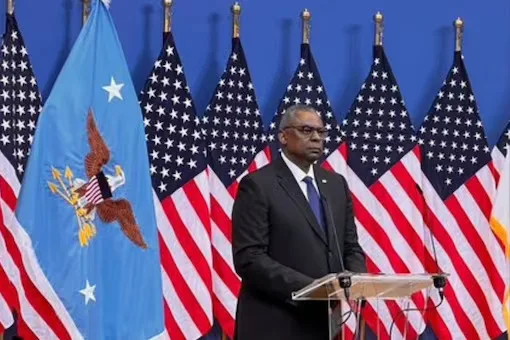 |
| (Photo credit: Twitter/US Defense Secretary Lloyd Austin) |
MANAMA, Bahrain (AP) — The United States and other countries will create a new force to protect ships transiting the Red Sea, where some have been attacked with drones and ballistic missiles fired from Houthi-controlled areas of Yemen, said U.S. Secretary of Defense Lloyd Austin on Tuesday in Bahrain.
The severity of the attacks, some of which have damaged ships, has led some shipping companies to instruct their vessels to stand by and not enter the Bab el-Mandeb strait until the security situation can be resolved.
The U.S. Central Command reported on Monday two new attacks on commercial vessels. A drone and a ballistic missile attack hit a tanker near Yemen, roughly at the same time that a cargo ship reported an explosive that detonated in the water near the vessel, according to the military.
"This is an international challenge that requires collective action," Austin declared in a statement issued shortly after midnight in Bahrain. "Therefore, today I announce the establishment of Operation Guardian of Prosperity, a new and significant multinational security initiative."
At any given time, there are about 400 commercial ships in the southern Red Sea, explained a high-ranking military officer who accompanied Austin to the region.
In the new mission, military ships will not necessarily escort a specific vessel but will deploy to provide general protection to as many as possible at any given time, the officer anonymously stated to offer additional details of the operation that had not been made public.
Mohammed Abdel-Salam, spokesman and chief negotiator for the Houthis, challenged the coalition on Tuesday and said that Iranian-backed rebels would continue to attack ships linked to Israel near Yemen.
"The coalition formed by the Americans is to protect Israel and militarize the sea without any justification, and it doesn't prevent Yemen from continuing its legitimate operations in support of Gaza," he wrote on X platform.
The Houthi attacks, he claimed, "are not a show of force or a challenge to anyone," adding that "those who want to expand the conflict must bear the consequences of their actions."
On Tuesday, the shipping company Maersk announced that it had decided to redirect its ships, which had been detained for days outside the strait and the Red Sea, and send them instead around Africa and through the Cape of Good Hope, a much longer and less efficient route. Maersk said it welcomed the creation of the international security initiative, but for now, the longer route would offer "more predictable results" for its customers.
In the past four weeks, Houthi militants have attacked or detained commercial ships 12 times, and they still hold 25 crew members of the MV Galaxy Leader in Yemen, Austin noted in a ministerial meeting on the new maritime mission. The United States continues to seek members who can join and tries to increase the number of navies present and participating.
Currently, the United Kingdom, Bahrain, Canada, France, Italy, the Netherlands, Norway, Seychelles, and Spain have joined, said Austin. Some of the countries will conduct joint patrols, while others will provide intelligence support in the southern Red Sea and the Gulf of Aden.
A notable absence was China, which has military ships in the region but has not responded to previous requests for assistance from commercial vessels, even though some of the attacked ships had ties to Hong Kong, the military officer said.
Other countries have also agreed to participate in the operation but prefer not to be named publicly, said a defense official anonymously to discuss details of the new mission that have not been publicly announced.
The mission will be coordinated by the existing Combined Task Force 153, created in April 2022 to enhance maritime security in the Red Sea, the Bab el-Mandeb strait, and the Gulf of Aden. The group has had 39 member countries, but officials were working to determine which of them would participate in this latest project.
The United States has also urged the United Nations Security Council to take action against the attacks.
Two U.S. Navy destroyers—the USS Carney and the USS Mason—have been patrolling daily through the Bab el-Mandeb strait to help deter and respond to Houthi attacks.
The expansion of the operation came after three commercial vessels were hit by missiles fired by the Houthis from Yemen on December 3.
To date, the United States has not counterattacked the Houthis or targeted any of the Yemeni fighters' weapons or other facilities. On Monday, Austin did not respond to the question of why the Pentagon had not counterattacked.

.png)